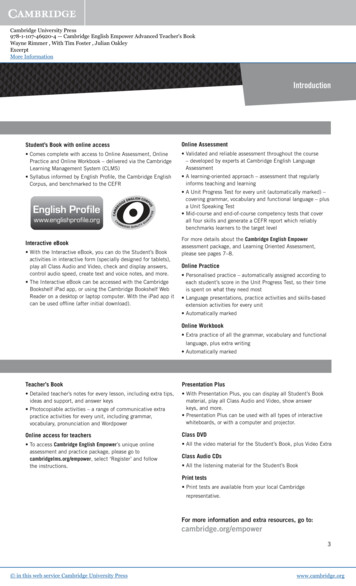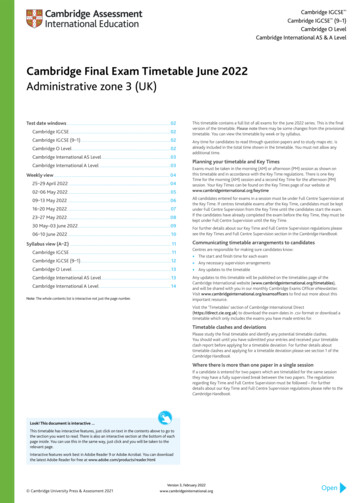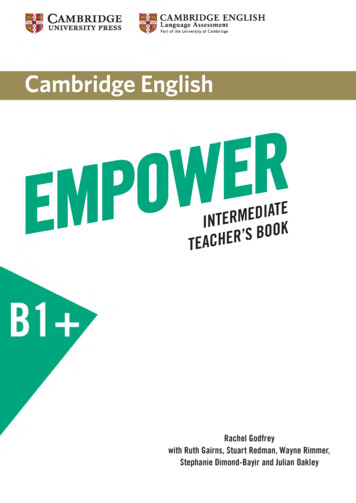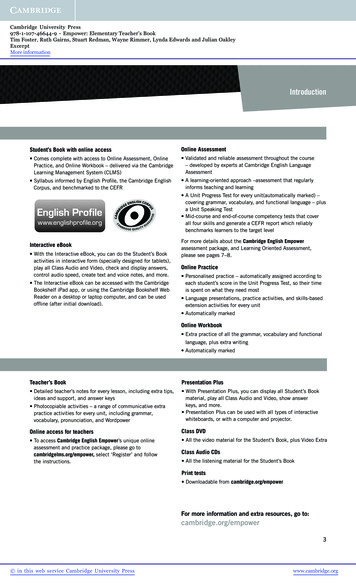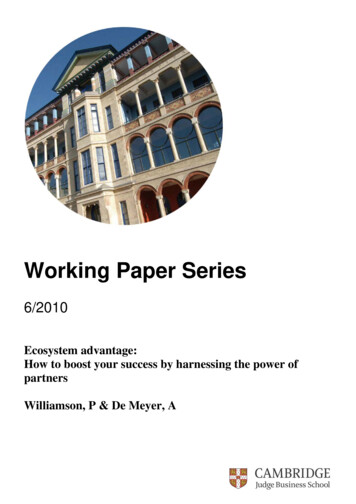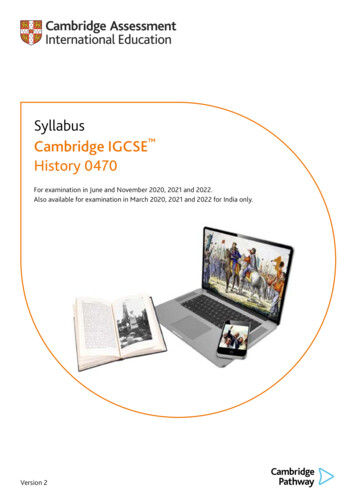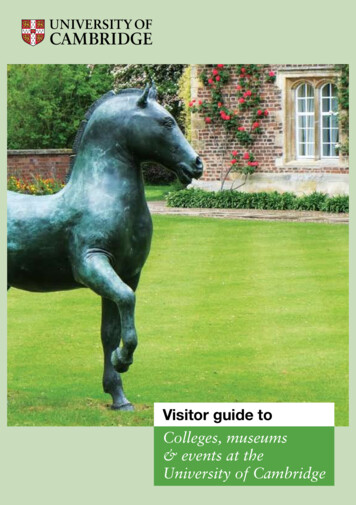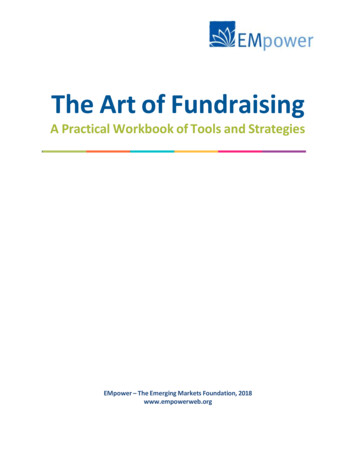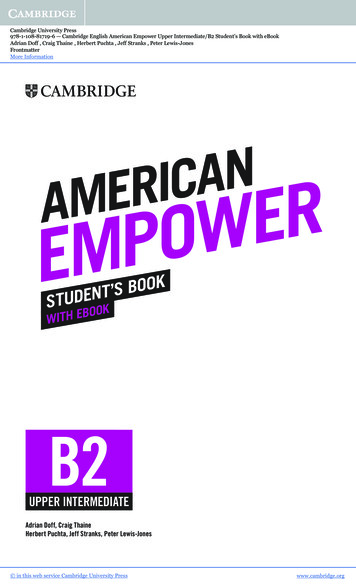
Transcription
Cambridge University Press978-1-108-81719-6 — Cambridge English American Empower Upper Intermediate/B2 Student's Book with eBookAdrian Doff , Craig Thaine , Herbert Puchta , Jeff Stranks , Peter Lewis-JonesFrontmatterMore InformationNACIREMAERWOPEMKOOBS’TNEDUST OOKBWITH EB2UPPER INTERMEDIATEAdrian Doff, Craig ThaineHerbert Puchta, Jeff Stranks, Peter Lewis-Jones in this web service Cambridge University Presswww.cambridge.org
Cambridge University Press978-1-108-81719-6 — Cambridge English American Empower Upper Intermediate/B2 Student's Book with eBookAdrian Doff , Craig Thaine , Herbert Puchta , Jeff Stranks , Peter Lewis-JonesFrontmatterMore InformationAMERICAN EMPOWER is a six-level general English coursefor adult and young adult learners, taking students from beginnerto advanced level (CEFR A1 to C1). American Empower combinescourse content from Cambridge University Press with validatedassessment from the experts at Cambridge Assessment English.American Empower’s unique mix of engaging classroom materialsand reliable assessment enables learners to make consistent andmeasurable progress.CAN DO OBJECTIVESContent you’ll love.Assessment you Discuss possible future events Prepare for a job interview Discuss advantages and disadvantages Write an argument for and againstan ideacan trust.UNITCHANCE5GETTING STARTEDaLook at the picture and answer the questions.1234What is the woman doing?Would you like to try something like that? Why / Why not?What could the woman be thinking?Imagine you’re on the beach below. What would yoube thinking?bDiscuss the questions.1 Why do you think some people like doing extreme anddangerous things?2 Do you think they do these things in spite of the risk orbecause of the risk?5555with American EmpowerBetter Learning is our simple approach where insights we’ve gainedfrom research have helped shape content that drives results . in this web service Cambridge University Presswww.cambridge.org
Cambridge University Press978-1-108-81719-6 — Cambridge English American Empower Upper Intermediate/B2 Student's Book with eBookAdrian Doff , Craig Thaine , Herbert Puchta , Jeff Stranks , Peter Lewis-JonesFrontmatterMore InformationLearner engagementContent that informs and motivates1InsightsContentResultsSustained motivationis key to successfullanguage learning andskills development.Clear learning goals, thoughtprovoking images, texts, andspeaking activities, plus videocontent to arouse curiosity.Content that surprises, entertains,and provokes an emotional response,helping teachers to deliver motivatingand memorable lessons.UNIT 55A1Learn to talk about your family andfamilytohistoryLearndiscuss possible future eventsYOU COULD LIVE TOBE A HUNDREDG FutureGSimpleprobabilitypast: bea Long and Happy Life” quickly. Choose the correctwords to complete the summary.WHY WE THINK WE’REAre you an optimist or a pessimist?Mark your place on this scale, then comparewith others in your group.OptimistGOING TO HAVEPessimistDecide what you think about the questions,then compare your answers.I’ll get a perfectscore.I’ll probably fail.2 Do you expect the coming week to be ?exciting/greatboring/terrible3 Imagine you left your bag on the bus. Do you expectto get it back?YesNodb Read the article again. Check ( ) the five points madein the article. we keep polluting the planet because we’re sure thatwe’ll find a way to clean it up some day 1234NoCommunication 5A Now go to p. 129.Based on your answers in 1b, decide who in yourgroup ? is the most optimistic is the most pessimistic is the most realistic5WE’RE ALL ABOVE AVERAGE!THE OPTIMISM BIASTry asking a 20-year-old these questions:This certainty that our future is bound to be better thanour past and present is known as the “Optimism Bias,”and researchers have found that it is common to people allover the world and of all ages. Of course, the OptimismBias can lead us to make some very bad decisions. Often,people don’t take out travel insurance because they’resure everything will be all right, they don’t worry aboutsaving up for old age because the future looks fine, orthey smoke cigarettes in spite of the health warnings onthe pack because they believe “It won’t happen to me.”Or on a global scale, we keep polluting the planet becausewe’re sure that we’ll find a way to clean it up some day inthe future. What kind of career will you have?How long do you think you’ll live?Most people think they’ll be able to earn above-averagesalaries, but only some of the population can make thatmuch. Most young men in Europe will say they expectto live well into their 80s, but the average life expectancyfor European men is 75. Most people will give an answerthat is unrealistic because nearly everyone believes theywill be better than the average. Obviously, they can’t allbe right.Most people are also optimistic about their own strengthsand abilities. Ask people, “How well do you get along withother people?” or “How intelligent are the people in yourfamily?” and they’ll usually say they’re above average.Again, they can’t all be right. We can’t all be better thaneveryone else, but that’s what we think.LOOKING ON THE BRIGHT SIDE4 You start a new workout routine and you’re reallytired the next day. Do you expect it to be easierthe next time?YesA LONG AND HAPPY LIFEResearchers have found that people all over theworld share an important characteristic: optimism.Sue Reynolds explains what it’s all about.1 If you take a test at the end of this class,how well will you do?cMost people are naturally optimistic / pessimistic, and thisis generally an advantage / a disadvantage for the humanrace because it helps us to be realistic about the future /more successful.SPEAKINGIMISTOPT?or a PESSIMISTba Read the article “Why We Think We’re Going to HaveFamily; Yearsand datesdescribingattitudeVV AdjectivesAre you anaREADING2There is a reason for this. Research has shown that, onthe whole, we are optimistic by nature and have a positiveview of ourselves. In fact, we are much more optimisticthan realistic and frequently imagine things will turn outbetter than they actually do. Most people don’t expecttheir marriages to end in divorce, they don’t expect tolose their jobs, or to be diagnosed with a life-threateningdisease. Furthermore, when things do go wrong, they areoften quick to find something positive in all the gloom.Many people who fail exams, for example, are convincedthey were just unlucky with the questions and they’ll dobetter next time. Or people who have had a serious illnessoften say that it was really positive because it made themappreciate life more. We really are very good at “looking onthe bright side.”678c Discuss the questions. Look again at your answers in 1b. Do you think you havethe “Optimism Bias”? Do you agree that it’s better to be optimistic than realistic?Why / Why not? How do you see yourself 20 years from now?VOCABULARY3Adjectives describing attitudeOPTIMISM IS GOOD FOR YOUBut researchers believe that the Optimism Bias is actuallygood for us. People who expect the best are generallylikely to be ambitious and adventurous, whereas peoplewho expect the worst are likely to be more cautious, sooptimism actually helps to make us successful. Optimistsare also healthier because they feel less stress – they canrelax because they think that everything is going to bejust fine. Not only that, but the Optimism Bias may alsohave played an important part in our evolution as humanbeings. Because we hoped for the best, we were preparedto take risks such as hunting down dangerous animalsand traveling across the sea to find new places to live, andthis is why we became so successful as a species. Evenif our optimism is unrealistic and leads us to take risks,without it we might all still be living in caves, too afraid togo outside and explore the world in case we get eaten bywild animals.Pessimists usually have fewer friends than optimists.Humans are naturally positive about their future.Reality is often worse than we imagine it to be.People who live in warmer countries are usuallymore optimistic.We often act (or don’t act) because we’re confidenteverything will work out.If we imagine a better future, we will take more risks.Optimists spend a lot of time daydreaming.Optimism about the future makes us feel better inthe present.a Find adjectives in “Why We Think We’re Going toHave a Long and Happy Life” that mean:123456expecting the future to be goodseeing things as they arenot seeing things as they areprepared to take risksnot prepared to take riskswanting to be successful.b Which of these adjectives best describe you?cNow go to Vocabulary Focus 5A on p. 158.e Write a question to find out if other studentsare optimistic or pessimistic. Add a) and b)answer choices.Example:You want to buy a shirt you like, but the store issold out. What do you think?a) I’m sure I can find it somewhere else.b) Why am I always so unlucky?562Many people who fail examsare convinced they were justunlucky with the questions Even if our optimism is unrealistic and leads us to takerisks, without it we might all still be living in caves 57Personalized and relevantInsightsLanguage learners benefit from frequentopportunities to personalize their responses.ContentPersonalization tasks in every unit make the targetlanguage more meaningful to the individual learner.ResultsPersonal responses make learning more memorableand inclusive, with all students participating inspontaneous spoken interaction. in this web service Cambridge University PressThere are so manyadjectives to describe sucha wonderful series, but inmy opinion it’s very reliable,practical, and modern.Zenaide Brianez, Directorof Studies, Instituto daLíngua Inglesa, Brazilwww.cambridge.org
Cambridge University Press978-1-108-81719-6 — Cambridge English American Empower Upper Intermediate/B2 Student's Book with eBookAdrian Doff , Craig Thaine , Herbert Puchta , Jeff Stranks , Peter Lewis-JonesFrontmatterMore InformationMeasurable progress1Assessment you can trustInsightsContentResultsTests developed and validated byCambridge Assessment English,the world leaders in languageassessment, to ensure they areaccurate and meaningful.End-of-unit tests, mid- and endof-course competency tests, andpersonalized CEFR test reportforms provide reliable informationon progress with language skills.Teachers can see learners’progress at a glance, andlearners can see measurableprogress, which leads togreater motivation.Results of an impactstudy showing %improvement of Readinglevels, based on globalEmpower students’scores over one year.We started using thetests provided with Empowerand our students startedshowing better results fromthis point until now.Kristina Ivanova, Director ofForeign Language TrainingCentre, ITMO University,Saint Petersburg, Russia2Evidence of impactInsightsContentResultsSchools and collegesneed to show thatthey are evaluatingthe effectivenessof their languageprograms.Empower (British English) impactstudies have been carried out invarious countries, including Russia,Brazil, Turkey, and the UK, to provideevidence of positive impact andprogress.Colleges and universities havedemonstrated a significantimprovement in language levelbetween the mid- and end-of-coursetests, as well as a high level ofteacher satisfaction with Empower. in this web service Cambridge University Presswww.cambridge.org
Cambridge University Press978-1-108-81719-6 — Cambridge English American Empower Upper Intermediate/B2 Student's Book with eBookAdrian Doff , Craig Thaine , Herbert Puchta , Jeff Stranks , Peter Lewis-JonesFrontmatterMore InformationManageable learning1Mobile friendlyInsightsContentResultsLearners expect onlinecontent to be mobilefriendly but also flexibleand easy to use on anydigital device.American Empower provideseasy access to DigitalWorkbook content that workson any device and includespractice activities with audio.Digital Workbook content is easyto access anywhere, and producesmeaningful and actionable data soteachers can track their students’ progressand adapt their lesson accordingly.I had been studyingEnglish for 10 years beforeuniversity, and I didn’tsucceed. But now withEmpower I know my levelof English has changed.Nikita, Empower Student,ITMO University, SaintPetersburg, Russia2Corpus-informedInsightsCorpora can provide valuable informationabout the language items learners are ableto learn successfully at each CEFR level.ContentTwo powerful resources – CambridgeCorpus and English Profile – informedthe development of the Empower coursesyllabus and the writing of the materials.ResultsLearners are presented with the targetlanguage they are able to incorporateand use at the right point in their learningjourney. They are not overwhelmed withunrealistic learning expectations. in this web service Cambridge University Presswww.cambridge.org
Cambridge University Press978-1-108-81719-6 — Cambridge English American Empower Upper Intermediate/B2 Student's Book with eBookAdrian Doff , Craig Thaine , Herbert Puchta , Jeff Stranks , Peter Lewis-JonesFrontmatterMore InformationRich in practice1 Language in useInsightsContentResultsIt is essential that learnersare offered frequent andmanageable opportunitiesto practice the languagethey have beenfocusing on.Throughout the American EmpowerStudent’s Book, learners are offered awide variety of practice activities, plentyof controlled practice, and frequentopportunities for communicativespoken practice.Meaningful practicemakes new language morememorable and leadsto more efficientprogress in languageacquisition.UNIT 55D1SKILLS FOR WRITINGLearn to write an argument forand against an ideaWe need to change the way we liveW Arguing for and against an ideaSPEAKING AND LISTENINGaHow can we helpprotect the environment?Discuss the questions.1 What environmental problems are shown in photos a–d?2 What environmental problems exist in your country orregion? Which do you think are the most serious?3 What action can people take to help solve them?Listen to the news reports and match thembwith photos a–d. What key words helped you decide?05.19c05.19What did the news reports say aboutthese topics?1234beekeepers – bees – pesticides – farmers – fruit treesair pollution – smog – masks – coal – exhaust fumesplastic – birds, sea animals, and fish – the sea – 2050fires – rainforest – wildfires – clearing forest for land –soccer fieldsRetell the reports. Listen again if necessary.dDiscuss the questions.1 Have you ever heard a news report like those in 1b aboutyour own country or a country you know? What happened?2 Which of these statements do you agree with the mostand why? We are responsible as individuals for protecting theenvironment. We can solve most environmentalproblems by behaving in a more responsible way. The main responsibility for protecting the environmentshould lie with governments and large companies. Thereisn’t much that individuals can do to change things.3 What actions do you think (a) governments, (b) largecompanies, and (c) individuals can take to protectthe environment?abc1Modern technology has many benefits– we can produce food cheaper and ingreater quantities, we can manufacture thethings we need more efficiently, and we cantravel and communicate more easily. On theother hand, our activities can have negativeLeonimpacts on the environment. It is wellknown that we are polluting our oceans with plastic and chemicals,many species are dying out, and natural areas are disappearing ascities spread. Scientists agree that we need to take urgent actionto protect the world we live in before it’s too late. But how can wedo this?2Most people accept that in order to protect the environment,we need to change the way we live. As individuals, we can help theenvironment by living simpler: we can buy fewer things and keepthings we buy longer. We can also use public transportation and onlyuse cars and planes when necessary; we can eat locally-producedfood to cut down on transportation costs; and we can recycle more.People with their own houses and gardens can compost their food,grow organic vegetables, and invest in solar panels to provide energy.3However, not everyone agrees that the responsibility forprotecting the environment lies with individuals. They point outthat most environmental destruction is caused by companies,not individual people. For example, many people are worried thatwidespread use of fertilizers and pesticides threatens wildlife andpollutes soil and water, and that cutting down forests destroys thehabitats of birds and animals. Also, pollution of the sea is oftencaused by waste from factories or by spills from oil tankers, andscientists warn that overfishing by large commercial fishing fleetscould lead to fish disappearing from our oceans. Some peoplebelieve these things can only be changed by introducing new laws,not by asking individuals to change their lifestyle.4My own view is that both of these opinions are correct. Wecan do a lot as individuals to help the environment by behavingin a more responsible way, but that is not enough. We also needgovernments to take action to reduce pollution and improve theenvironment, and rich countries should lead the way in doing that.c Notice how Leon uses expressions like these toREADING2report people’s opinions.a Leon wrote an essay discussing the topic ofIt is well known that Scienti sts agree that protecting the environment. Read the essay andanswer the questions.1 Which of these sentences best summarizes the essay?a Leon considers whether individuals or governments cando the most to protect the environment.b Leon describes different ways in which we aredamaging the environment.2 What is Leon’s conclusion?a It’s not clear how we can best protect the environment.b Both individuals and governments should act to protectthe environment.Find more expressions in the essay that:1234d Write sentences in response to these questions,using expressions from 3c.b Read the essay again and make brief notes on theDoes recycling plastic really make much difference to theenvironment?Would eating less meat help protect the environment?Are pesticides causing bees to die out?main points Leon makes.WRITING SKILLS3Arguing for and against an ideaa Match four of the descriptions below to paragraphs1–4 in the essay. report what other people say or think (x3)report how people feel (x1)report what scientists say (x1)report what Leon thinks himself (x1).Introduction – stating the problemIntroduction – giving Leon’s point of viewHow individuals can help protect the environmentHow large companies damage the environmentHow large companies can help the environmentConclusion – restating the problemConclusion – Leon’s point of view4Are extreme weather events a sign of climate change?Is building nuclear power stations the best way to provide“clean” energy?Should airfares be increased to discourage people fromtraveling by plane?bb Answer the questions.1 Why does Leon ask a question in the first paragraph?2 How does Leon make his arguments seem more objective(i.e., not just his own opinion)?WRITINGa Work in pairs. Choose one of the essay topics.Discuss the topic you chose and take noteson possible arguments for and against. Thendecide on your conclusion.c Work on your own. Plan your essay using thestructure in 3a.dCompare your notes with your partner andexplain roughly what you plan to write.e Write the essay in about 150–200 words, usingexpressions in 3c.f Swap essays with another student. Does theessay ?1 have a clear structure2 set out the arguments in a clear way3 use suitable expressions for reporting opinionsDo you agree with the conclusion?d65642 Beyond the classroomThere areplenty ofopportunities forpersonalization.Elena Pro,Teacher, EOIde San Fernandode Henares,SpainInsightsProgress with language learning often requires work outside of theclassroom, and different teaching models require different approaches.ContentAmerican Empower is available with a print workbook, online practice,documentary-style videos that expose learners to real-world English, plusadditional resources with extra ideas and fun activities.ResultsThis choice of additional resources helps teachers to find the most effectiveways to motivate their students both inside and outside the classroom. in this web service Cambridge University Presswww.cambridge.org
Cambridge University Press978-1-108-81719-6 — Cambridge English American Empower Upper Intermediate/B2 Student's Book with eBookAdrian Doff , Craig Thaine , Herbert Puchta , Jeff Stranks , Peter Lewis-JonesFrontmatterMore InformationUnit overviewUnit OpenerGetting started page – Clear learning objectives to givean immediate sense of purpose.Lessons A and BDigital Workbook(online, mobile):Grammar and VocabularyGrammar and Vocabulary – Input and practiceof core grammar and vocabulary, plus a mix of skills.Lesson CDigital Workbook(online, mobile):Listening and SpeakingEveryday English – Functional languagein common, everyday situations.Unit Progress TestLesson DIntegrated Skills – Practice of all fourskills, with a special emphasis on writing.Digital Workbook(online, mobile):Reading and WritingReviewExtra practice of grammar, vocabulary, and pronunciation. Also a“Review your progress” section for students to reflect on the unit.Mid- / End-of-course testAdditional practiceFurther practice is available for outside of the class withthese components.Digital Workbook (online, mobile)Workbook (printed)ComponentsResources – Available on cambridgeone.org Audio Video Unit ProgressTests (Print) Unit ProgressTests (Online) Mid- andend-of-courseassessment (Print) Mid- andend-of-courseassessment (Online) in this web service Cambridge University Press Digital Workbook (Online) Photocopiable Grammar,Vocabulary, and Pronunciationworksheetswww.cambridge.org
Cambridge University Press978-1-108-81719-6 — Cambridge English American Empower Upper Intermediate/B2 Student's Book with eBookAdrian Doff , Craig Thaine , Herbert Puchta , Jeff Stranks , Peter Lewis-JonesFrontmatterMore InformationCONTENTSLesson and objectiveGrammarUnit 1 Outstanding peopleGetting started Discuss meeting famous people1A Discuss people you admireReview of tenses1BDiscuss a challenge1CExplain what to do andcheck understanding1DWrite an jectivesThe letter e; Word stressTrying andsucceedingRapid speechReview and extension More practiceEveryday EnglishCutting a conversation short;Explaining and checkingunderstandingWORDPOWER makeUnit 2 SurvivalGetting started Discuss coping with natural disasters2ADiscuss dangerous situationsNarrative tensesExpressions withget2BGive advice on avoiding dangerFuture time clausesand conditionalsAnimals and theenvironment2CGive and respond to compliments2DWrite guidelines in a leaflethad beenIntonation in question tagsReview and extension More practiceAgreeing using question tags;Giving compliments andrespondingWORDPOWER faceUnit 3 TalentGetting started Discuss what makes something a work of art3ADiscuss ability and achievementMulti-word verbsAbility andachievement3BDiscuss sports activities and issuesPresent perfectand present perfectcontinuousWords connectedwith sports3CMake careful suggestions3DWrite a description of dataWord stressSound and spelling:Consonant soundsReview and extension More practiceKeeping to the topic of theconversation; Making carefulsuggestionsWORDPOWER upUnit 4 Life lessonsGetting started Discuss childhood experiences4ADiscuss events that changedyour lifeused to and wouldCause and result4BDiscuss and describe rulesObligation andpermissionTalking aboutdifficulty4CDescribe photos4DWrite an email to apply for workSound andspelling: uContrastive stressReview and extension More practiceDescribing photos; Expressingcareful disagreementWORDPOWER asUnit 5 ChanceGetting started Discuss attitudes to risk5ADiscuss possible future eventsFuture probabilityAdjectivesdescribing attitude5BPrepare for a job interviewFuture perfect and futurecontinuousThe natural world5CDiscuss advantages anddisadvantages5DWrite an argument for and againstan ideaReview and extension More practiceSound andspelling: thIntonation groupsResponding to an idea;Discussing advantages anddisadvantagesWORDPOWER side2 in this web service Cambridge University Presswww.cambridge.org
Cambridge University Press978-1-108-81719-6 — Cambridge English American Empower Upper Intermediate/B2 Student's Book with eBookAdrian Doff , Craig Thaine , Herbert Puchta , Jeff Stranks , Peter Lewis-JonesFrontmatterMore ation about JocelynBell-BurnellArticles: “Apple’s DesignGenius” and “The Woman WhoReinvented Children’s TV”Discussing inspiring peoplePodcast: The 30-Day ChallengeInterviews: “30-Day Challenge”Asking and answering questionsabout challengesStarting a new jobCutting a conversation short; Explainingand checking understandingConversation about technologyArticle: “Tech Free!”Discussing technologyConversation about a survival situationArticle: “Lost at Sea”Telling a survival storyInterview: The TigerLeaflet: “How to Survive anAnimal Attack”Giving advice; Asking questionsCooking for a friendAgreeing using question tags; Givingcompliments and respondingTalking about getting lostLeaflet: “Be Wise and Survive!”Discussing the natural environmentConversation: learning experiencesText about learning: “Learningto Learn”Talking about something you have put alot of effort intoRadio show: The Sports GeneArticle: “Born to Be the Best”;Three articles about athletesDiscussing sports and ways to improveperformanceMaking party plansPlanning a party; Keeping to the topicof the conversation; Making carefulsuggestionsInterviews about sportsArticle: “Fitness: SeattleSnapshot”Talking about popular sportsInterview: Psychology of Money;Two monologues: Life-Changing EventsTwo texts about winning thelotteryTalking about how your life haschangedTwo monologues: training for a jobArticle: “Training for theEmergency Front Line”Discuss experiences of trainingand rulesPresenting photosDescribing photos; Expressing carefuldisagreementThree monologues: living in differentplacesAd for being an internationalstudent “buddy”Discussing living in a different countryMonologue: What Are Your Chances?Quiz: “Are You an Optimist or aPessimist?”; Article: “Why WeThink We’re Going to Have aLong and Happy Life”Discussing possible future eventsConversation: talking about workQuiz: “The Unknown Continent”;Article: “Working in Antarctica”Role play: a job interviewMoney problemsNews reports: environmental problemsDiscussing advantages anddisadvantages; Responding to an ideaEssay about protecting theenvironmentGiving opinions on environmentalproblemsWritingUnit Progress TestArticleOrganizing an articleUnit Progress TestGuidelinesOrganizing guidelines in a leafletUnit Progress TestArticle describing dataDescribing dataUnit Progress TestJob applicationGiving a positive impressionUnit Progress TestFor and against essayArguing for and against an idea3 in this web service Cambridge University Presswww.cambridge.org
Cambridge University Press978-1-108-81719-6 — Cambridge English American Empower Upper Intermediate/B2 Student's Book with eBookAdrian Doff , Craig Thaine , Herbert Puchta , Jeff Stranks , Peter Lewis-JonesFrontmatterMore InformationLesson and objectiveGrammarVocabularyPronunciationConsonant groupsEveryday EnglishUnit 6 Around the globeGetting started Discuss traveling6ADiscuss choicesGerunds and infinitivesTravel and tourism6BDiscuss changesThe passiveDescribing change6CIntroduce requests and sayyou are grateful6DWrite a travel blogConsonant soundsReview and extension More practiceIntroducing requests;Showing you are gratefulWORDPOWER outUnit 7 City livingGetting started Discuss the design of new buildings7ADiscuss living in citiestoo / enough; so / suchDescribing life incities7BDiscuss changes to a homeCausative have / getMovies and TV;Houses7CImagine how things could be7DWrite an email to complainSound andspelling: oStress in compound nounsReview and extension More practiceImagining how things couldbe; Using vague languageWORDPOWER downUnit 8 DilemmasGetting started Discuss attitudes to money8ADiscuss personal financeFuture real and present /future unreal conditionalsMoney and finance8BDiscuss moral dilemmas and crimePast unreal conditional;should have pastparticipleCrime8CHow to be encouraging8DWrite a reviewStressed andunstressed wordsWord groupsReview and extension More practiceBeing encouraging;Showing you have things incommonWORDPOWER takeUnit 9 DiscoveriesGetting started Discuss the impact of new inventions9ADiscuss new inventionsRelative clausesHealth9BDiscuss people’s lives andachievementsReported speech;Reporting verbsVerbs describingthought andknowledge9CExpress uncertainty9DWrite an essay expressing a pointof viewSound andspelling: uiLinking and intrusionReview and extension More practiceExpressing uncertainty;Clarifying amisunderstandingWORDPOWER comeUnit 10 PossibilitiesGetting started Discuss goals and expectations10A Speculate about the pastPast modals of deductionAdjectives withprefixes10B Discuss life achievementsWishes and regretsVerbs of effort10C Describe how you feltWord stressConsonant groupsDescribing how youfelt; Interrupting andannouncing news10D Write a narrativeReview and extension More practiceCommunication Plus p.127WORDPOWER wayGrammar Focus p.134Vocabulary Focus p.1544 in this web service Cambridge University Presswww.cambridge.org
Cambridge University Press978-1-108-81719-6 — Cambridge English American Empower Upper Intermediate/B2 Student's Book with eBookAdrian Doff , Craig Thaine , Herbert Puchta , Jeff Stranks , Peter Lewis-JonesFrontmatterMore InformationContentsListeningReadingSpeakingTwo monologues about sightseeingtoursWebsite about three touristdestinations; Website: “Whereto Go?”Comparing different tourist destinationsInterview: disappearing languagesArticle: “Danger! DyingLanguages”Agreeing and
AMERICAN EMPOWER is a six-level general English course for adult and young adult learners, taking students from beginner to advanced level (CEFR A1 to C1). American Empower combines course content from Cambridge University Press with validated assessment from the experts at Cambridge Assessment English. American Empower

